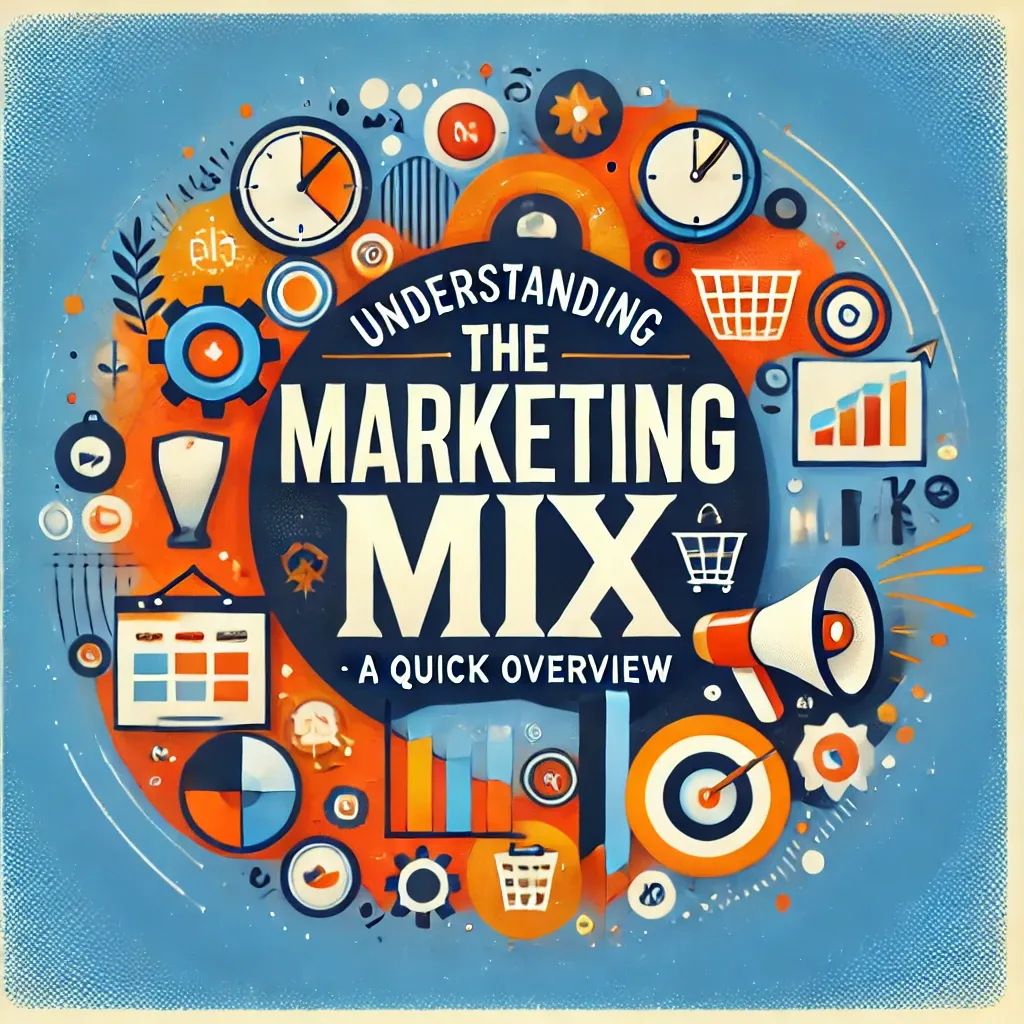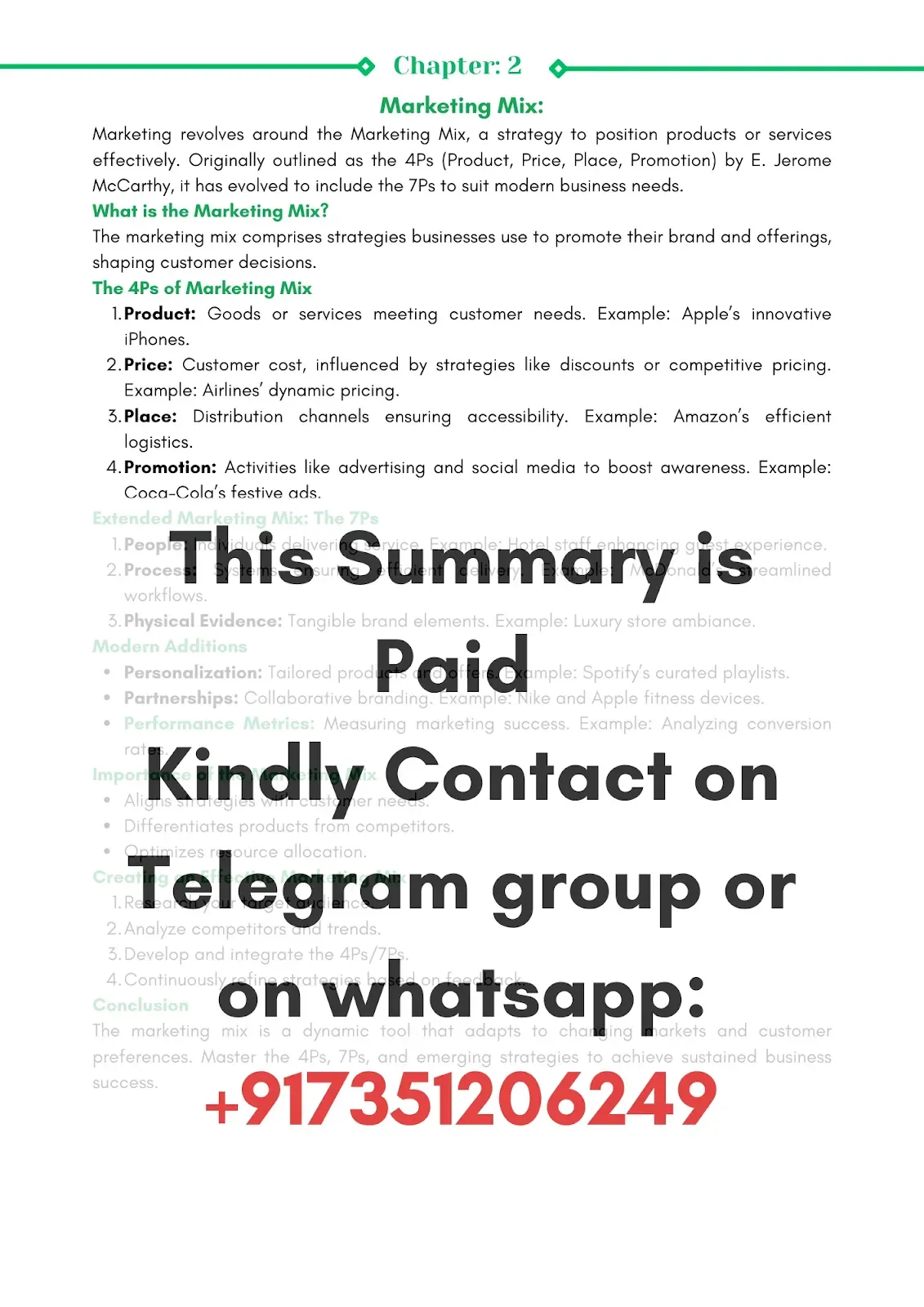Table of Content
Click Here See PPT
Summary of This Chapter{Click on Me}
Marketing is a cornerstone of business success, and at the heart of effective marketing lies the concept of the Marketing Mix. This strategic framework helps businesses effectively position their products or services in the market, satisfying both organizational goals and customer needs. In this blog post, we will delve deeply into the components of the marketing mix, often referred to as the 4Ps (Product, Price, Place, Promotion), and explore its extended versions like the 7Ps and beyond.
What is the Marketing Mix?
The marketing mix is a set of actionable strategies that businesses use to promote their brand and products. First introduced by Neil Borden in the 1950s and later refined by E. Jerome McCarthy into the 4Ps model, it serves as a blueprint for businesses to influence consumer decision-making effectively.
The 4Ps of Marketing Mix
1. Product
Definition: Refers to the goods or services offered by a business to meet customer needs.
- Product features and quality
- Brand identity and packaging
- Product lifecycle (introduction, growth, maturity, decline)
Example: Apple focuses on innovation and user-friendly design in its products like the iPhone, ensuring they stand out in the competitive tech market.
2. Price
Definition: The cost customers pay for a product or service.
- Pricing strategies (skimming, penetration, competitive pricing)
- Perceived value vs. cost
- Discounts, offers, and payment terms
Example: Airlines often use dynamic pricing based on demand, time, and competition to optimize revenue.
3. Place
Definition: Distribution channels used to make a product available to customers.
- Online vs. offline presence
- Supply chain efficiency
- Accessibility and convenience for the target market
Example: Amazon’s extensive logistics network ensures fast delivery to customers worldwide.
4. Promotion
Definition: Activities undertaken to inform and persuade customers about a product or service.
- Advertising (TV, online, print)
- Sales promotions (coupons, discounts)
- Public relations and social media campaigns
Example: Coca-Cola’s holiday-themed ads effectively create an emotional connection with consumers.
Extended Marketing Mix: The 7Ps
As services became a dominant part of the global economy, the 4Ps model expanded to include three additional elements:
5. People
Refers to all individuals involved in delivering a product or service, from employees to customer service teams.
Example: Hospitality businesses like hotels rely heavily on well-trained staff to enhance customer experience.
6. Process
Covers the systems and workflows that ensure efficient service delivery.
Example: Fast-food chains like McDonald’s optimize their processes to provide consistent service worldwide.
7. Physical Evidence
Tangible and intangible elements that customers associate with a brand.
Example: The ambiance of a luxury store contributes to the perceived value of its products.
Evolving the Marketing Mix: Beyond the 7Ps
In today’s digital-first world, new dimensions of the marketing mix are emerging to address technological advancements and changing consumer behaviors:
-
Personalization: Tailoring products and promotions to
individual preferences.
Example: Spotify’s personalized playlists and recommendations enhance user engagement. -
Partnerships: Collaborating with other brands for mutual
benefit.
Example: Co-branding initiatives like Nike and Apple’s collaboration on fitness devices. -
Performance Metrics: Tracking and analyzing the
effectiveness of marketing strategies.
Example: Businesses use KPIs like conversion rates and customer acquisition costs to measure success.
Importance of the Marketing Mix
- Strategic Alignment: Helps businesses align their marketing strategies with customer needs and market trends.
- Competitive Advantage: Provides a framework to differentiate products from competitors.
- Resource Optimization: Ensures efficient allocation of resources across various marketing activities.
How to Develop an Effective Marketing Mix?
- Understand Your Target Audience: Conduct market research to identify customer preferences and pain points.
- Analyze the Market: Study competitors and industry trends to identify opportunities and threats.
- Integrate the 4Ps/7Ps: Develop a cohesive strategy that leverages all elements of the marketing mix.
- Test and Refine: Use A/B testing and customer feedback to optimize your marketing mix continuously.
Conclusion
The marketing mix is not a static formula but a dynamic tool that evolves with changing market conditions and customer expectations. By mastering the 4Ps, extending into the 7Ps, and incorporating modern strategies, businesses can craft a robust marketing approach that drives growth and customer satisfaction.
Leverage the power of the marketing mix to unlock your business’s full potential in today’s competitive landscape!
Save this PPT
How To DownloadIf you see the 'Generating Download link' then check your Internet Speed and refresh this page. Even then if you face any Problems contact me, through the below link.
WhatsApp me!



